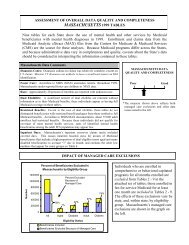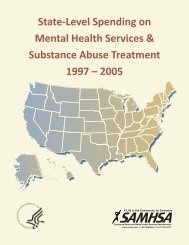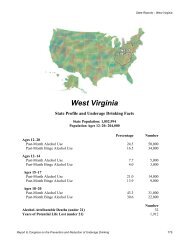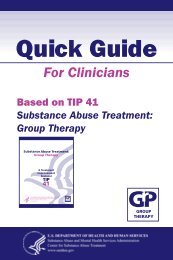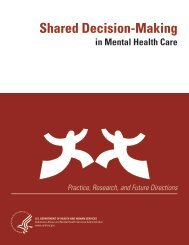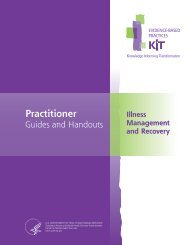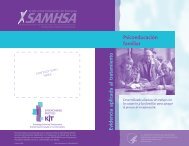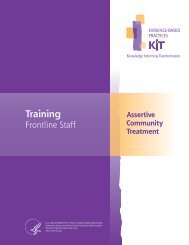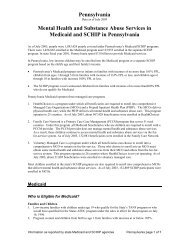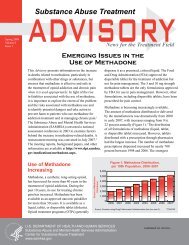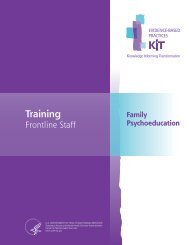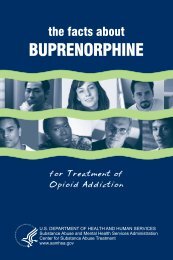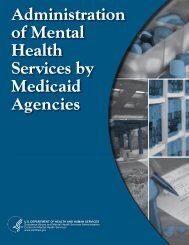TAP 21 - SAMHSA Store - Substance Abuse and Mental Health ...
TAP 21 - SAMHSA Store - Substance Abuse and Mental Health ...
TAP 21 - SAMHSA Store - Substance Abuse and Mental Health ...
You also want an ePaper? Increase the reach of your titles
YUMPU automatically turns print PDFs into web optimized ePapers that Google loves.
Addiction Counseling Competencies<br />
(i.e., more than 5 years). Although “least experienced” was defined as no more than 3 years’ paid<br />
experience, many “least experienced” counselors reported more than 3 years of employment in<br />
the addiction profession. This may be the result of a mistaken inclusion of other experiences in<br />
the field such as volunteer service, internships, or personal treatment <strong>and</strong> recovery. The least<br />
experienced counselors had the smallest proportion certified, whereas clinical supervisors had<br />
the highest proportion certified.<br />
Data reduction procedures. Given the huge number of possible cross-tabulations with a<br />
survey this size, results have been summarized in three different ways. First, because the purpose<br />
of the study was to identify “essential” competencies, survey responses were collapsed into<br />
percentages of respondents rating each item “4” or “5” (“good” or “excellent”). Excluding the<br />
“moderate” ratings provides a more stringent st<strong>and</strong>ard for judging the content validity of the<br />
competencies. Second, results were provided for the national sample only. Third, responses<br />
were summarized across individual competencies within the 12 competency categories.<br />
Validation of the 1<strong>21</strong> competencies. Internal consistency of the survey was high: Cronbach’s<br />
Alpha for the 12 sections of the survey ranged from 0.91 to 0.98. Among the clinical<br />
supervisors, 40 percent of respondents indicated that entering practitioners needed to be “good”<br />
or “excellent” in all 1<strong>21</strong> competencies; 60 percent gave these ratings for 118 of the 1<strong>21</strong> competencies;<br />
<strong>and</strong> 70 percent gave these ratings for 107 of the 1<strong>21</strong> competencies. Clearly, the surveyed<br />
competencies had high content validity for these experienced practitioners.<br />
Gaps between actual <strong>and</strong> needed competencies. Large differences were found between<br />
perceived needed <strong>and</strong> actual proficiency, across all three respondent groups. As exhibit 7 indicates,<br />
the gap was most pronounced among clinical supervisors. For all but 1 of the 1<strong>21</strong> items,<br />
less than half the supervisors rated actual proficiencies as “good” or “excellent.” Exhibit 8 displays<br />
the percentage gaps for each of the 12 categories, as reported by clinical supervisors only. Gaps<br />
between actual <strong>and</strong> needed proficiencies are evident across categories, ranging from a 44-percent<br />
gap for the “Referral” category to a 54-percent gap for the “Counseling” category. Just as the<br />
perceived need for counselor competencies was consistently high, the perceived level of actual<br />
competencies was consistently low.<br />
Congruence among perceptions of counselor groups. As exhibit 7 indicates, although<br />
the three counselor groups are consistent with one another in their ratings of need, they differ<br />
consistently in their ratings of actual proficiency. In each category the lowest ratings were given<br />
by supervisors, followed by “most proficient” <strong>and</strong> then “least experienced” counselors. Differences<br />
between supervisors <strong>and</strong> least experienced counselors were lowest in the “Treatment<br />
Planning” category <strong>and</strong> greatest—not surprisingly—in the “Professional Readiness” category.<br />
Competency subsets. Ratings of some subsets of the competencies indicate a need for<br />
further study. For example, supervisors <strong>and</strong> counselors seemed to undervalue competencies<br />
related to research <strong>and</strong> treatment outcome assessment. The Committee included these competencies<br />
because it felt that the counselors’ abilities to assess <strong>and</strong> monitor outcomes <strong>and</strong> apply<br />
research findings to their own practices were important <strong>and</strong> would contribute to the professionalization<br />
of the field.<br />
In sum, this survey revealed large <strong>and</strong> consistent gaps between actual <strong>and</strong> needed competencies<br />
across all categories, with clinical supervisors perceiving the largest differences.<br />
192



